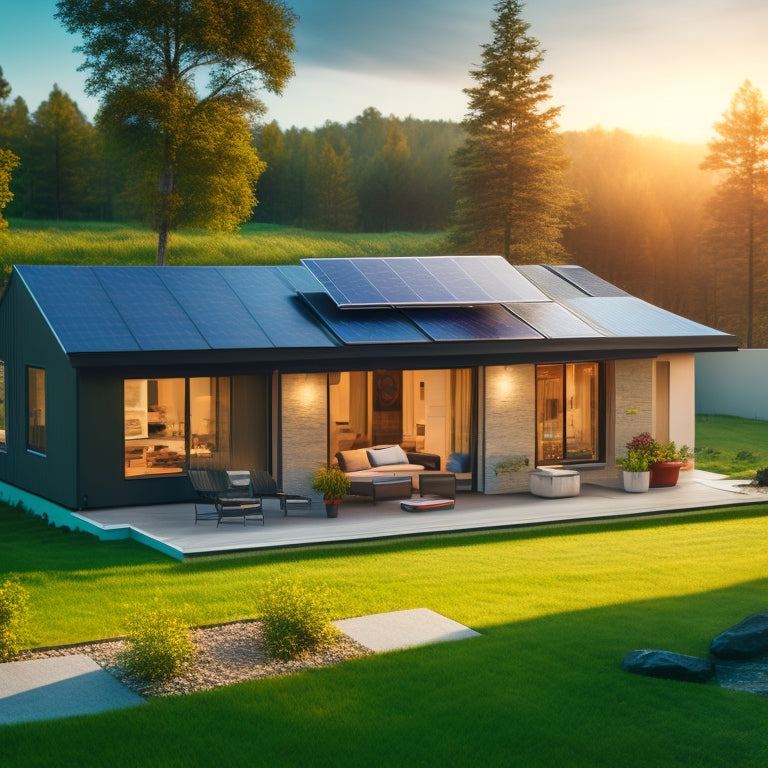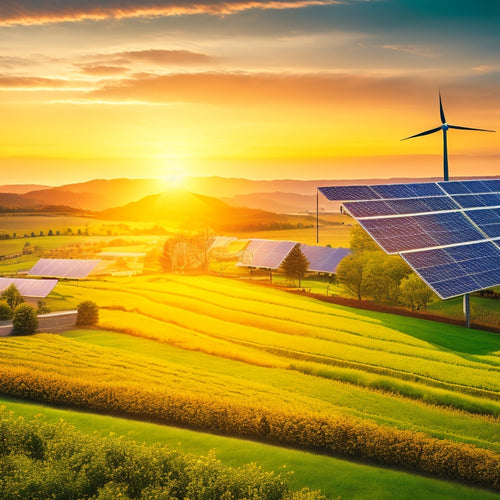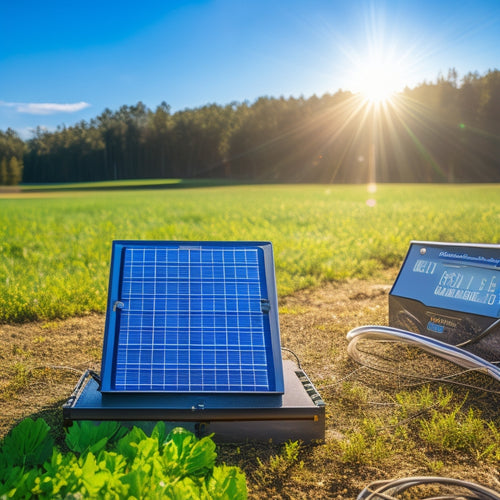
Backup Systems for Home Independence
Share
You're seeking energy independence and a reliable backup system to power your home during outages, and a well-designed solar power backup system can provide exactly that. Solar backup systems work by utilizing sunlight through photovoltaic panels, storing excess energy in deep cycle batteries, and providing uninterrupted power supply during low sunlight. To achieve energy independence, you'll need to assess your energy requirements, select compatible components, and consider factors like system size, battery capacity, and grid connection. By understanding the benefits, design considerations, and cost-effective solutions, you'll be well on your way to securing a reliable backup system - and there's more to investigate to guarantee you get it just right.
Key Takeaways
- Solar power backup systems provide energy independence, reducing reliance on the grid and minimizing environmental impact.
- A well-designed system with high-efficiency panels and smart charging ensures steady electricity during low sunlight periods.
- Battery capacity determines the duration of power during outages, and selecting the right battery is crucial for optimal performance.
- Grid-tie and off-grid systems offer different benefits, with grid-tie systems selling excess energy and off-grid systems providing complete independence.
- Regular maintenance, including cleaning and inspecting panels, is essential to ensure optimal system performance and extend its lifespan.
Benefits of Solar Power Backup
When the grid goes down, you're left in the dark, but with a solar power backup system, you can switch to self-sufficiency mode, powering your essential appliances and lighting. This means achieving energy independence, reducing your reliance on the grid, and embracing sustainable living.
By utilizing renewable resources, you'll minimize your environmental impact and contribute to a cleaner future. With the benefits of energy independence and cost savings, you'll reduce your energy bills and enhance your property value.
A well-designed solar power backup system guarantees battery longevity, efficient energy storage, and peak system efficiency. With advancements in technology, you can even integrate home automation features, ensuring smooth changes during power outages.
How Solar Backup Systems Work
You're probably wondering how solar backup systems generate power and are designed to meet your energy needs. The process starts with solar power generation, where photovoltaic panels convert sunlight into electrical energy.
To guarantee a reliable and efficient system, high-efficiency panels with high-capacity solar inverters grid independence are vital to provide uninterrupted energy.
Additionally, deep cycle batteries with smart charging and real-time monitoring secure steady electricity during low sunlight.
To guarantee a reliable and efficient system, you'll need to take into account key design factors, such as system size, battery capacity, and grid connection requirements.
Solar Power Generation
A solar backup system's power generation component employs sunlight to produce electricity, providing a reliable source of energy during outages.
You'll benefit from solar energy innovations, which have made this technology more efficient and cost-effective. The system converts sunlight into electrical energy through photovoltaic (PV) panels, typically installed on your roof or in your yard.
As you generate electricity, it's stored in a battery bank, ready to power your home during an outage. Renewable technology trends have also improved the efficiency of energy storage systems, allowing you to store excess energy for later use.
With a solar power generation system, you'll reduce your reliance on the grid and have a sustainable source of energy.
System Design Considerations
As you integrate a solar backup system into your home, understanding how it works is vital to guaranteeing a seamless and efficient supply of power during outages.
You'll want to take into account key system design factors to maximize system efficiency and minimize downtime.
-
Assess your energy requirements: Identify your essential loads and their power consumption to size your system accurately.
-
Select compatible components: Verify your inverter, battery, and solar array are compatible and optimized for your specific needs.
-
Implement load management: Prioritize your energy usage to make sure critical loads receive power during outages.
-
Evaluate system monitoring: Real-time monitoring allows you to track performance, identify issues, and perform maintenance efficiently.
-
Plan for scalability: Design your system to accommodate future expansions or upgrades as your energy needs evolve.
Choosing the Right Solar Battery
Selecting a suitable solar battery is essential to guaranteeing your home's energy independence.
You'll want to contemplate battery capacity, which determines how long your system can power your home during an outage. Calculate your energy needs based on your fundamental appliances and lighting, and choose a battery that can meet those demands.
When evaluating battery performance, look for key features such as depth of discharge and round-trip efficiency to confirm optimal energy utilization. Additionally, weigh the importance of advanced battery management systems that enhance charging and discharging for better performance.
Installation options are also significant, as they impact the battery's performance and lifespan. You can opt for a floor-mounted or wall-mounted battery, depending on your available space and desired aesthetics.
Additionally, reflect on the battery's chemistry, such as lithium-ion or lead-acid, which affects its efficiency, durability, and maintenance requirements.
Solar Panel Maintenance Tips
Three key areas of your solar panel system require regular maintenance to confirm peak energy production: the panels themselves, the mounting system, and the electrical connections.
To guarantee ideal performance, you'll want to:
-
Perform solar panel cleaning every 6 months to remove debris and dirt that can reduce energy output by up to 25%
-
Inspect the mounting system for signs of wear and tear, and tighten any loose bolts or screws
-
Check electrical connections for signs of corrosion or damage, and replace any faulty components
-
Schedule annual inverter maintenance to confirm it's functioning correctly and efficiently
-
Monitor your system's performance regularly to identify any potential issues before they become major problems
Grid-Tie Vs Off-Grid Systems
Your solar-powered home's energy independence hinges on the type of system you choose: grid-tie or off-grid. This decision considerably impacts your energy reliability, cost, and overall independence.
| System Type | Characteristics |
|---|---|
| Grid-Tie | Tied to the grid, sells excess energy, grid tie advantages: lower upfront cost, net metering benefits |
| Grid-Tie | Requires grid connection, no energy storage |
| Off-Grid | Standalone system, stores excess energy, off grid challenges: higher upfront cost, battery maintenance |
| Off-Grid | Energy independence, no grid connection required |
| Both | Both options require proper system sizing and installation |
When choosing between grid-tie and off-grid systems, consider your energy needs, budget, and independence goals. Weigh the benefits and challenges of each option to make an informed decision.
Cost-Effective Solar Solutions
One essential factor in achieving energy independence is finding cost-effective solar solutions that align with your budget and energy needs.
You want to maximize energy efficiency while minimizing costs.
-
Consider affordable installations with energy-efficient panels that generate more power per hour of sunlight.
-
Look for systems with high-capacity batteries to store excess energy for later use.
-
Opt for smart inverters that optimize energy production and reduce waste.
-
Choose a system with a monitoring platform to track performance and identify areas for improvement.
-
Take advantage of government incentives and tax credits to reduce upfront costs.
Common Solar Backup Misconceptions
You may be hesitant to invest in a solar backup system due to common misconceptions.
One misconception is that solar power isn't reliable enough to provide consistent energy during outages, but modern systems can guarantee a steady supply.
Another misconception is that batteries are too expensive, but advances in technology have made them more affordable and efficient.
Solar Isn't Reliable Enough
Grid outages often spark concerns about solar reliability, fueling the misconception that solar power is too unpredictable to serve as a reliable backup system for home independence.
However, you might be surprised to learn that solar energy reliability is higher than you think.
-
Solar panels can still generate power during grid outages, even on cloudy days, as long as the system is designed with energy storage.
-
Modern solar systems can adjust to changing weather conditions, ensuring a stable power output.
-
You can optimize your solar system's performance by orienting panels correctly, cleaning them regularly, and monitoring their health.
-
Solar energy can be stored in batteries for later use, providing a reliable backup during grid outages.
-
With proper design, installation, and maintenance, solar power can be a reliable backup system for your home.
Batteries Are Too Expensive
Frequently, homeowners dismiss solar backup systems due to the perceived high cost of batteries, a misconception that can be a major roadblock to achieving home independence.
You might be surprised to learn that batteries aren't the only option for storing renewable energy. In fact, there are several battery alternatives that can be just as effective at a lower cost.
For instance, you could consider using a generator as a backup power source, or even a capacitor-based system.
These alternatives can provide a reliable source of power during outages, without breaking the bank.
Frequently Asked Questions
Can I Use My Existing Solar Panels With a New Backup System?
You can likely reuse your existing solar panels with a new backup system, but it depends on their compatibility with the new system's solar panel integration and energy storage options, so assess their technical specs carefully.
Will a Solar Backup System Power My Entire Home?
Oh, absolutely, you'll be living like royalty with your entire home powered by a solar backup system... just kidding, it depends on your battery capacity and energy efficiency - realistically, it'll cover your essentials, not your 5,000-watt home theater.
Are Solar Backup Systems Compatible With All Appliances?
You'll find that solar backup systems' appliance compatibility varies, depending on power management and individual appliance requirements; some systems can handle entire homes, while others may prioritize essential loads, so it's vital to assess your specific needs.
Can I Expand My Solar Backup System in the Future?
You're thinking ahead, great! Yes, you can expand your solar backup system in the future, thanks to modular designs that allow for future upgrades, ensuring system compatibility and flexibility as your energy needs evolve.
Do Solar Backup Systems Require Special Installation Permits?
You'll likely need to obtain installation permits, as solar backup systems are subject to local installation regulations, which vary by region, and maneuvering through the permit processes can be complex, so it's crucial to research and comply with area requirements.
Related Posts
-

Net Metering in Renewable Energy's Future
Net metering's future is vital for driving renewable energy growth and financial savings. You can reduce your electri...
-

Renewable Energy Solutions to Reduce Your Carbon Footprint
To reduce your carbon footprint, adopting renewable energy solutions is key. Using solar panels or wind turbines can ...
-

Choosing the Right Solar Power Charge Controller
Choosing the right solar power charge controller is crucial for maximizing energy efficiency and extending battery li...


